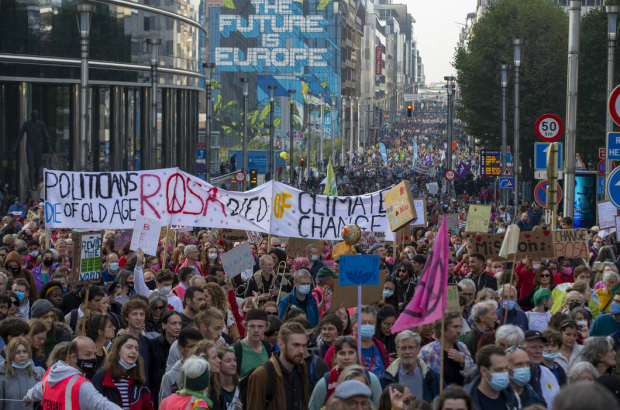- Daily & Weekly newsletters
- Buy & download The Bulletin
- Comment on our articles
Tens of thousands attend climate march in Brussels
After almost a year and a half of suspended large-scale activities due to the coronavirus crisis, climate protestors returned to the streets of Brussels on Sunday with the Brussels-Capital/Ixelles police estimating that around 25,000 people took part in the march. The actual figure could be much higher, with stewards supervising the demonstration later claiming more than 50,000 were in attendance.
Organised by the Climate Coalition, a movement which involves more than 80 civil society organisations, the march started shortly after 14.00 in front of the Brussels-North station and wound its way slowly through the city towards the Cinquantenaire park where the crowds gathered to hear speeches.
This latest Climate Coalition march comes three weeks before the COP26 international climate change conference being held in Glasgow, Scotland, from 31 October. The conference, which lasts until 12 November, comes at a time when fires, droughts, storms and floods are causing alarm all over the world, with activists calling for drastic and immediate action to avert a climate emergency.
"We expect ambitious, solidarity-based and coherent measures," said the president of the Climate Coalition, Nicolas Van Nuffel, referring to the expectations placed on the shoulders of the world’s leaders attending COP 26. One of the main challenges they face is to keep the +1.5°C warming target in sight, while aiming for carbon neutrality by 2050.
However, activists are demanding much more. According to the latest UN assessment, the current commitments required of the international community would lead, if they are kept, to a "catastrophic" warming of +2.7°C, far from the objective of the Paris Agreement to keep the rise in temperatures below +2°C, and if possible +1.55°C.
“After a year and a half, it is time to put the pressure back on for climate action,” added Van Nuffel. “The lockdown has not prevented us from acting. We must put the climate back at the heart of the political agenda after this Covid crisis and just before COP26.”
Van Nuffel called on governments on all levels to play their part, citing the condemnation of the Belgian federal state and its three regions by the Brussels Court of First Instance for their negligent climate policy. "The court condemns them for their inaction, but does not say what to do," he said.
"Here too, it is time to have a real national climate plan and that is what we are calling for. At the moment, we have federal and regional measures. Everyone acts in their own corner. The Climate Coalition tabled more than 100 proposals on the political table last March. We don't pretend that it's enough, but it can be a basis for discussion," he added.
It was clear from the mix of the people on the march that this is a generational issue. Parents walked with their children, young people mobilised in well-organised groups, adults of all ages, including many seniors, joined the demonstration and created a family atmosphere. Despite the joviality, the message from everyone was serious and clear.
"I'm here because I'm a grandparent who has been mobilised to help save the planet, because I'm really worried about my grandchildren,” said one woman. “I was keen to get involved in this association to change things and raise awareness among people of our age and also the youngsters because I would really like my grandchildren to live in a world that is safe for them, and also for my children, of course."
For this grandmother, change must happen now, and in a radical way: "It is absolutely necessary that we realise that continuing with pure and hard capitalism can only drive us straight into a wall,” she said. “A systemic change that is needed, really. And I think a lot of people are ready for it. That's what's interesting about this kind of demonstration, you see that people are ready and waiting."
"There are slogans that say, 'no more blah blah blah now we want actions', so yes, now there must be concrete actions on the part of politicians but also from the economic world which is behind many political decisions," she concluded.
“It is time to act rather than talk again," said one father, who came accompanied by his wife and four children. "We're fed up. We see all the time that it is progressing, that the climate is changing. Climate change is not 20 years from now."
"It is the children who ask us to come with them, we owe them that, we must do it," he concluded.
Among the people present on the march were many students from the ULB university in Brussels who were attending in organised groups. "We are marching so that the environmental crisis is placed firmly on the political agenda and that strong responses are made,” said one. “It is a generation that we represent, and we sincerely believe that it is possible to act now. Scientists are sounding the alarm but also giving hope, so we expect political reactions to match the crisis that we face."
For another ULB student, politicians have no excuse not to act now: "The Covid crisis has shown in particular that it is possible to act quickly in terms of large-scale public action and the climate crisis that awaits us requires this kind of rapid action,” he said. “We come to show that we are ready and that we are waiting for this action to happen. We represent who we are, that is to say young people, who are frightened, sometimes angry, but who want responses and want them now."


















